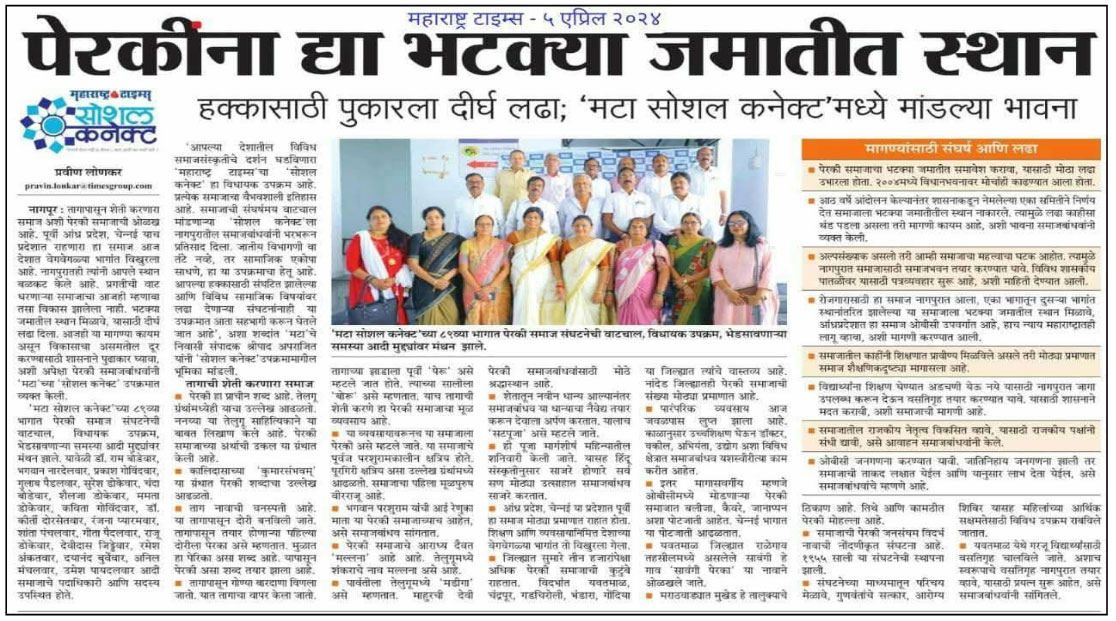
Give the Perki Community Their Rightful Place in the Nomadic Tribes Category
A Long Struggle for Recognition and Equality
(As featured in Maharashtra Times’ “Social Connect” initiative)
Introduction
Known for their traditional association with jute farming, the Perki community has a long history of resilience and migration. Originally settled in regions of Andhra Pradesh and Chennai, the community gradually spread across various parts of India — including Nagpur, where it has established a strong presence today.
Despite the community’s contributions and its cultural and agricultural heritage, its overall development has lagged behind. Members of the community continue to demand inclusion in the Nomadic Tribes (NT) category, a demand born out of decades of social and economic imbalance.
This sentiment was strongly voiced during the 89th edition of Maharashtra Times’ Social Connect program, where members of the Perki Samaj spoke about their journey, challenges, and continuous struggle for justice.
Social Connect: A Platform for Expression
The session saw active participation from prominent community leaders and members including:
Dr. Ram Bodewar, Bhagwan Naradelwar, Prakash Govindwar, Gulab Paydelwar, Suresh Dokewar, Chanda Bodewar, Shailaja Dokewar, Mamta Dokewar, Kavita Govindwar, Dr. Kirti Dorshetwar, Ranjana Pyarmwar, Shanta Panchalwar, Geeta Paidalwar, Raju Dokewar, Devidas Jiddewar, Ramesh Ankatwar, Dayanand Burvewar, Anil Manchalwar, and Umesh Paydelwar.
Speaking at the event, Maharashtra Times’ Resident Editor Shripad Aparajit highlighted the purpose of the initiative:
“The Social Connect series showcases the cultural diversity of our state. Every community has a glorious history and a story of struggle. Our goal is not division, but unity — bringing together communities that have fought for their rights and worked toward social harmony.”
Perki Community – The People of the Jute Fields
The word Perki has ancient roots. It is found in old Telugu texts, and literary scholars such as Nannayya have written about it.
In Kalidas’s Kumarasambhavam, the term Perki appears in reference to the “Taga” plant, a jute-like fiber plant used for making ropes and sacks.
- The first rope made from the jute fiber is called Perka, derived from which the name Perki evolved.
- Thus, the traditional occupation of the community — cultivating jute and weaving sacks and ropes — defines their name and identity.
- Historically, the community’s ancestors were Kshatriyas from the Puragiri lineage, with their earliest known forefather being Veerraju.
- Many members also believe that Renuka Mata, the mother of Lord Parashurama, belonged to the Perki community.
- The community’s chief deity is “Mallanna”, a Telugu form of Lord Shiva, while Parvati is worshiped as “Mahiga.”
- The Maa Mahur Devi temple is one of the community’s major pilgrimage sites.
Every year, after the harvest, members perform the “Sat Puja” — offering the season’s first grains to their deities. This ritual, along with other Hindu festivals, is celebrated with great devotion and unity.
Migration and Current Demographics
Historically, the Perki community resided mainly in Andhra Pradesh and Tamil Nadu, but over time, due to education and employment opportunities, they migrated to different regions across India.
Today:
- More than 3,000 Perki families live in Nagpur district alone.
- The community also has significant presence in Yavatmal, Chandrapur, Gadchiroli, Bhandara, and Gondia, as well as Nanded district.
- In Yavatmal’s Ralegaon Tehsil, the village Sawangi Perka bears the community’s name.
- Similarly, in Mukhed (Marathwada) and Kamptee (Nagpur), neighborhoods are known as Perki Mohalla.
Over time, their traditional jute-based occupation has nearly disappeared, giving way to new professions.
Many in the younger generation have achieved success as doctors, engineers, lawyers, entrepreneurs, and professionals, marking a shift toward modern education and employment.
Organization and Social Upliftment
The community is organized under a registered body called Perki Janasangham Vidarbha, founded in 1955.
Through this organization, several social initiatives have been undertaken:
- Introductory and matrimonial meets
- Felicitation of meritorious students
- Health and welfare camps
- Women’s empowerment programs for financial independence
A hostel for underprivileged students is currently being run in Yavatmal, and efforts are underway to establish a similar facility in Nagpur to support rural students pursuing higher education.
The Struggle for Inclusion in the Nomadic Tribes Category
The Perki community has long demanded to be recognized as part of the Nomadic Tribes (NT) category in Maharashtra.
- In 2004, the community organized a large protest march at the Vidhan Bhavan in Nagpur, seeking justice.
- Despite eight years of continuous advocacy, a government-appointed committee ultimately rejected the inclusion proposal.
- The community expressed that although the movement has slowed, the demand remains alive and just.
“We may be numerically small, but we are a vital part of society. The government must take steps to ensure our rightful representation and development,” community members emphasized.
Ongoing Demands and Future Vision
- Inclusion in the Nomadic Tribes category:
In Andhra Pradesh, the Perki community is listed under the Scheduled Castes. Members demand that the same recognition be extended in Maharashtra. - Community Hall and Hostel in Nagpur:
A permanent Perki Samaj Bhavan and student hostel should be established in Nagpur to serve as centers for education, culture, and unity. - Political Representation:
Political parties should provide opportunities to Perki leaders to ensure greater participation in policymaking. - Caste-Based Census (OBC Enumeration):
Conducting an OBC census will reveal the community’s strength and help ensure fair distribution of benefits. - Educational Support:
Many students still face financial barriers to education. Government assistance for hostel infrastructure and scholarships is essential to bridge this gap.
Conclusion
The Perki community has walked a long road — from the jute fields of ancient India to the professional corridors of modern Maharashtra.
Their identity, culture, and faith remain strong, but the call for social justice and equal recognition continues.
It is now up to the government, policymakers, and society to acknowledge this community’s contribution and grant them their rightful place among the Nomadic Tribes.
“Our struggle is not just for a label — it is for equality, dignity, and a fair chance at progress.”
– Reported from Maharashtra Times Social Connect (Nagpur Edition).
